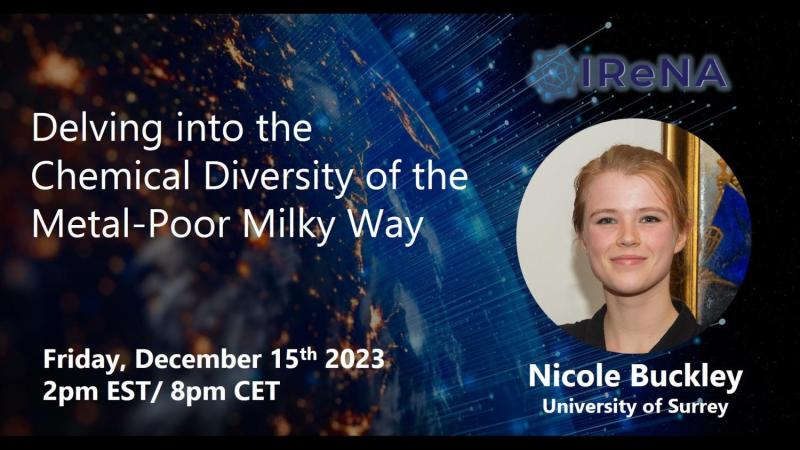Data
Delving into the Chemical Diversity of the Metal-Poor Milky Way featuring Nicole Buckley (University of Surrey)

Hosted by: Rob Yates (University of Hertfordshire)
The study of the Milky Way's (MW) stellar halo offers a window into the cosmic past because halo stars tend to be very old, with some born in the MW itself (in-situ halo) and others born in ancient satellite galaxies which have long since merged with the MW or been torn apart by tidal forces (accreted halo). In this talk, I will present existing techniques for recovering such substructures in the halo with a primary focus on chemical tagging. This method, akin to a "DNA fingerprint" for stars, involves matching the unique chemical abundance patterns found in stars to their original birth place. These patterns are imprinted by nucleosynthesis processes that occurred early in the galaxy's history, leaving behind distinct elemental signatures. By outlining the key elements and nucleosynthesis channels that contribute to elemental diversity, I will examine how successful chemical hyperplanes, such as [α/Fe] – [Fe/H], and [Mg/Mn] – [Al/Fe], differentiate between the thick and thin discs and accreted halo. Additionally, I will discuss the promise of neutron-capture abundances for distinguishing between the various metal-poor components of the MW, leveraging the extensive chemodynamical data provided by GALAH DR3. By constructing a chemical hyperplane using Principal Component Analysis (PCA), we utilise the information of 19 different abundances to determine which of these contribute the most to the chemical variance. We then employ a Gaussian mixture method called Extreme Deconvolution (XD) to disentangle chemically distinct groups in the resultant PCA-transformed plane, probing the metal-poor tail of the disc as well as the remnants of Gaia-Enceladus-Sausage, a dwarf galaxy which merged approximately 8-11 Gyr ago. Finally, I will discuss which novel abundance ratios may offer a physical interpretability when distinguishing stellar components which PCA lacks.
